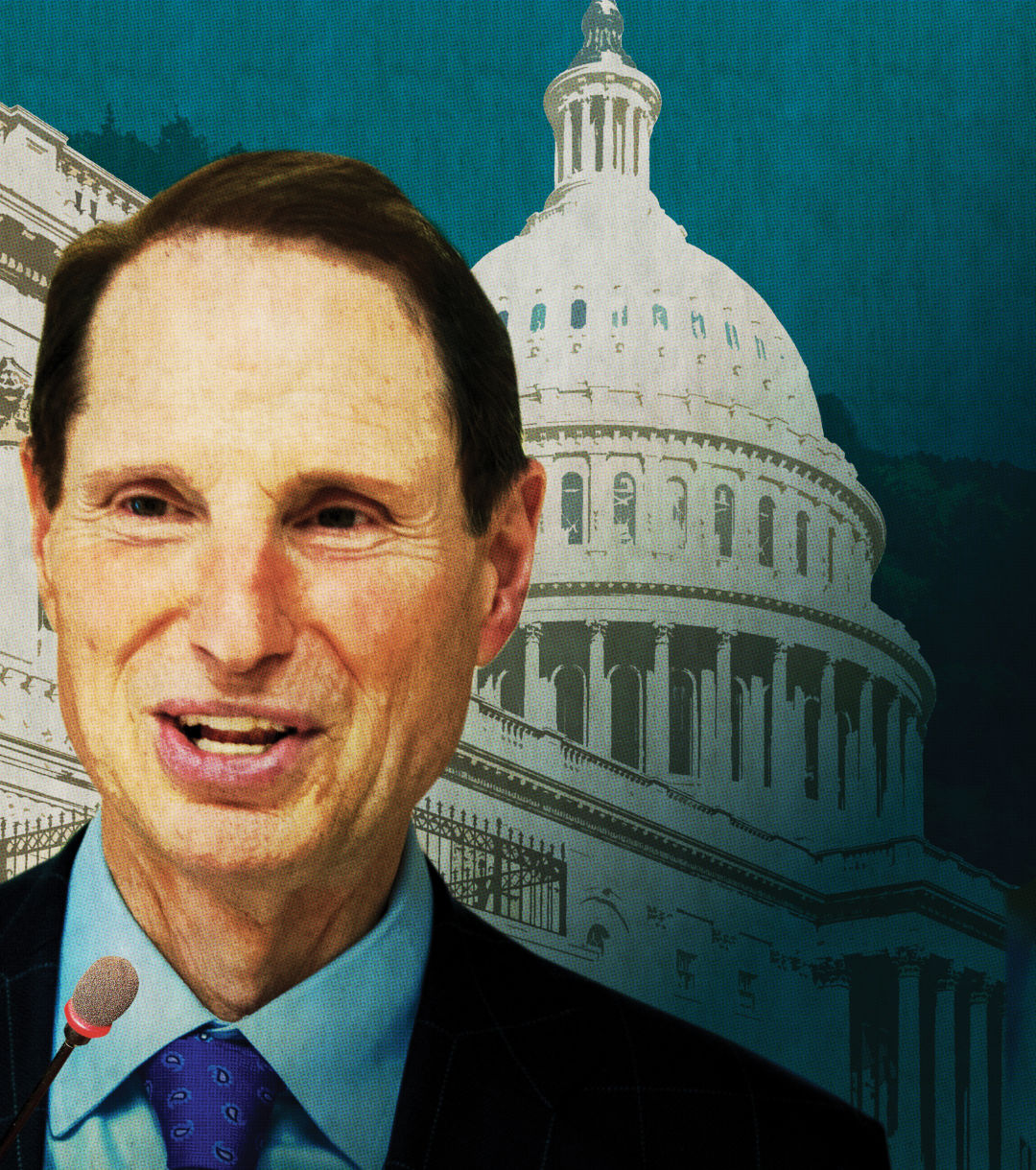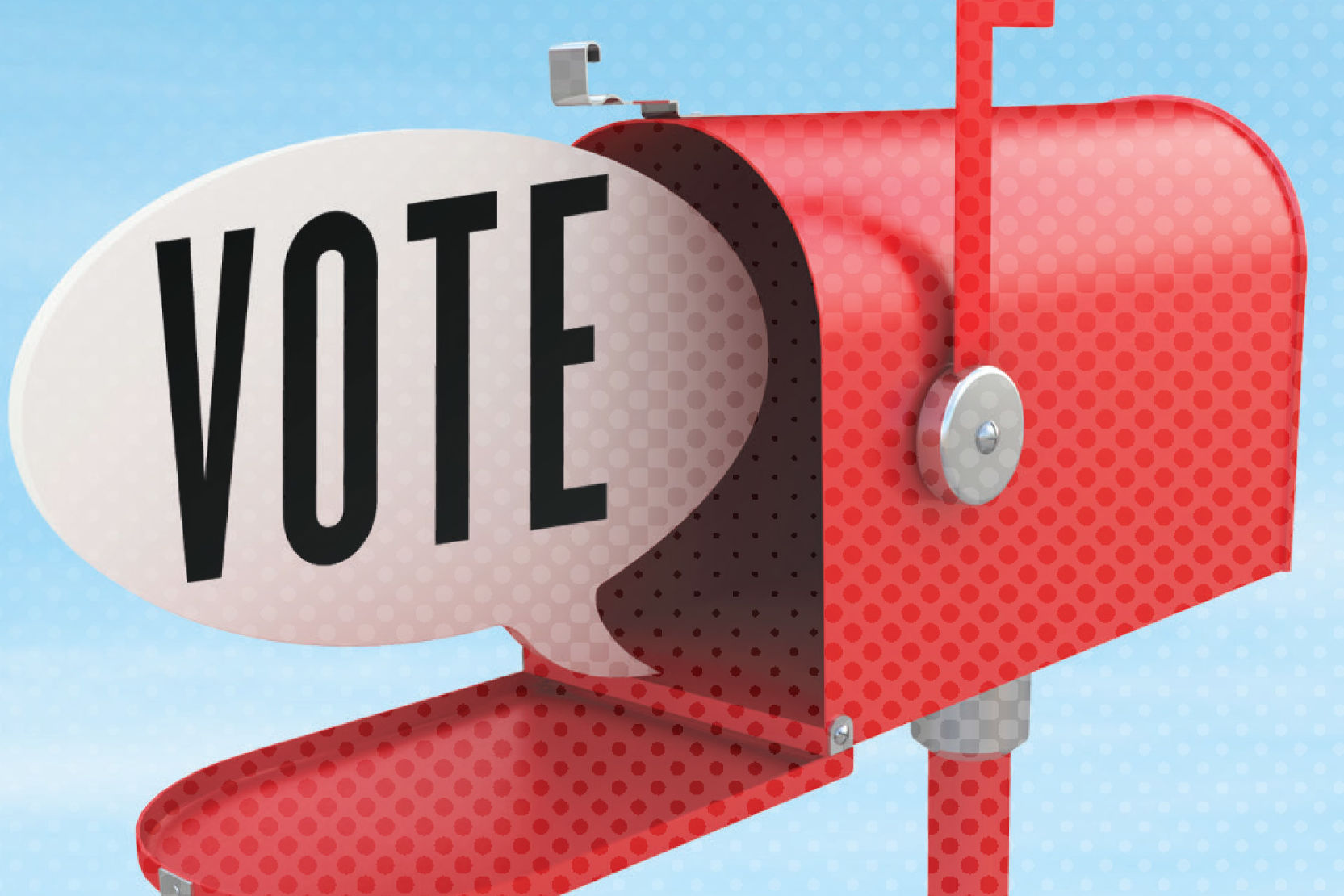Oregon Senator Ron Wyden Talks Russia, Republicans, and Reproductive Rights

"I continue to believe that bipartisanship is not about taking each other’s crummy ideas. Bipartisanship is about taking good ideas from both sides. That’s what I’ve come to call the Oregon Way."
Ten months in, 2017 has been ... interesting. But Oregon’s Ron Wyden has spent 21 years in the Senate, under four different presidents. And he isn’t fazed. With seats on the Senate’s powerful intelligence committee and on the finance committee, where he’s the ranking Democrat, our senior senator has both an inside view on Trump era turmoil and a broad perspective. One hot morning in early August, Wyden talked about what worries him now—and why he remains sanguine about America’s future.
What’s the mood in the Senate right now?
You have to recognize that senators talk for a living. So, they say lots of things. It’s deeds, rather than talk. The sanctions bill wouldn’t have passed four or five months ago. This was a strong message to the president of the United States, who’s traditionally been given a wide berth in terms of conduct of American foreign policy. Now there’s going to be new accountability. You saw how hard Trump pushed back. There’s no question, in the cloakrooms and talking to senators, that the tone has changed. But I’ve done this awhile now, and I try to make sure that the actual deeds match the words. That’s starting to come through now. First of all, you’re starting to see Republicans in the Senate push back at some of the really extreme stuff coming from the Trump side. You see that in the bipartisan sanctions bill. The United States Senate basically said, we really don’t trust the president of the United States with respect to this crucial issue.
Is bipartisanship even possible in 2017?
It’s a lot harder than it used to be. The right has gotten righter, the left has gotten lefter. And there’s just a lot of anger.
I continue to believe that bipartisanship is not about taking each other’s crummy ideas. Bipartisanship is about taking good ideas from both sides. That’s what I’ve come to call the Oregon Way. It’s not written down anywhere. There’s no big tablet in downtown Pioneer Square. But we take ideas that are good from anywhere. We’re compassionate. We’re fair. We’re proud of the fact that we’re innovative with Death with Dignity and protecting the beaches and vote by mail, which I have proposed taking national.
So, it’s definitely harder. What you do is start from where you’d like to be, and double back and get what you can. I’ll give you an example. In 2008 and 2009, I introduced what is still the only federal bipartisan universal coverage bill. Seven Democrats, seven Republicans. The idea was, you got to get everybody covered or there’s too much cost shifting. We obviously didn’t get everything we wanted. But we got some of the biggest stuff. We got, for example, airtight, loophole-free protection against discriminating against those with preexisting conditions. That [part of the Affordable Care Act] came right out of my bill, and affects thousands of Oregonians and millions of Americans.
Portland may vote blue, but Oregon as a whole looks really red. How do you balance that?
I’ve done 54 town meetings this year. We have 36 counties, and I go to every county every year. This year, my judgment was, there’s unprecedented interest, so I’m going to give people unprecedented access. The irony is, the differences have been sharper in the past—particularly on natural resources—between, say, rural communities in Eastern Oregon and the Pearl. I’ll tell you, the last few weeks, the issues driving the meetings both in counties where Clinton won by 20 and counties where Trump won by 20 have been health care and Russia. Those two issues.
What are people asking about Russia?
They understand that the Russian issue speaks to the legitimacy of their government. They want to know that their government is there for them. That’s what this is really code for. Trump won those areas, but there’s a lot of concern. They read Trump Jr.’s e-mails. They saw what Trump said to the Boy Scouts. This is another part of what I call the Oregon Way: we try to set the bar high.
It is very clear that the hacking threat is very substantial. It’s why I want a paper trail for every ballot cast. The intelligence leadership, last October, said that the Russians hacked our election. And when foreign powers attack American institutions, we don’t sit around and say, “That’s OK.” We push back. I can’t get into matters in front of the Intelligence Committee, but this is very serious: countries are looking to hack election processes in the West.
Speaking of the Intelligence Committee, you’ve been a huge advocate for digital privacy. Why that focus?
The Constitution can’t protect itself. It needs advocates. I’m a privacy hawk who thinks it’s a real dangerous world. My job on the Intelligence Committee is to break no rules, share no secrets, and ask the tough questions. National intelligence won’t give us the number of law-abiding Americans who are swept up in what’s called “702 searches,” which are searches on foreign threats overseas. But as global communications systems become more integrated, more and more law-abiding Americans are getting swept up. Intelligence agencies keep claiming that giving an analysis would pretty much be the end of Western civilization because they’ll have to drop what they’re doing, and they have to deal with other threats. My gut tells me that when they resist so strongly giving information, there’s a reason to keep digging.
You’ve also been a strong advocate for net neutrality.
Net neutrality is a straightforward concept. You pay your Internet access fee, you get to go where you want, when you want, how you want. That is net neutrality. All of these powerful special interests, cable companies and the like, want to change that. They’d like to have paid prioritization, which amounts to special lanes for people who give them more money. It’s almost like they want to go back to some kind of information aristocracy, where the well-to-do have access to a treasure trove of information and people of modest means, for whom the net has been a great equalizer in terms of access to information, would be rolled back.
The new FCC chairman, Mr. [Ajit] Pai, is with the big cable companies. They have such good PR. They’re always looking for ways to disguise their real intentions. Some of them are running ads saying, “We’re for net neutrality. There’s just too much government red tape. We want voluntary net neutrality.” Well, I saw [my son] William Peter Wyden this morning, when I got up on four hours sleep and he was running off to OMSI camp. There is as much chance of having the big cable companies comply with voluntary net neutrality as there is to have William Peter Wyden, age 9, voluntarily limit the number of desserts he eats. It’s not going to happen.
This summer, the Democratic Party has seen controversy—again—over accepting candidates who may not support abortion rights. What do you think?
As the ranking Democrat on the Finance Committee, we have jurisdiction over Medicaid, which is Planned Parenthood. I have said point-blank, anybody who’s going to take from women in America the right to go to a doctor they choose is going to have to run over me. And I’ll tell ya, women are going to win. Period.
Are you optimistic?
Look. Abba Eban, a wonderful Israeli diplomat, said at one point—I’m paraphrasing here—“The Americans always get it right.” Then, he paused, “After they’ve tried everything else.” I watch what goes on in this administration; this comes as close to “everything else” as I can imagine. We’re going to have a chance, fairly soon, to register whether the American people think this is the right direction to be going. People voted for Trump because they were promised a lot of changes. Seven months in, and they have really nothing to show for themselves. They replaced one conservative justice with another.
We’ve got a big job to do in terms of educating folks. But I’m with Abba Eban: when people get the facts, they get it right. I think in 2018 and 2020, voters are going to say, “Hey, there were a lot of promises made in 2016. Tell us what you’re actually going to do to make our lives better.”
Is there still time to right the ship?
I’m head of the glass-half-full caucus. But, yeah, we got to get going. There are challenges like climate change where time really matters. Look outside, Portland—it’ll be 109* today!
*In climate change’s defense, it got up to only 103.
Bi Curious: Four Bills Ron Wyden Moved Forward with Republican Help in 2017
S. 1343: The CHARITY Act
Among others, Wyden worked with John Thune and Pat Roberts of South Dakota and Kansas, respectively, to write the recursively acronymized Charities Helping Americans Regularly Throughout the Year Act, which would simplify tax requirements for big donors.
S. 1633: The Recreation Not Red-Tape Act
Written with conservative Utah representative Rob Bishop, the RNR Act would simplify the permitting process for outdoor guides and recreation activities.
S. 1717: Corporate Transparency Act
Along with Florida’s Marco Rubio (aka “Little Marco”), Wyden introduced this bill to end the owner anonymity of US-based shell corporations, which can funnel dark money into sex trafficking, fraud and terrorism. “It has been virtually impossible to track these shell corporations,” he says. “You spend months if not years trying to figure out who owns the place.”
S. 1875: Wildfire Disaster Funding Act
First introduced in 2013 with Idaho Republican Mike Crapo, Wyden’s bipartisan fix for wildfire funding has new life as an amendment to a pending flood insurance bill. The fix would put an end to the practice of obliging firefighting agencies to “steal” funds from fire prevention budgets.




